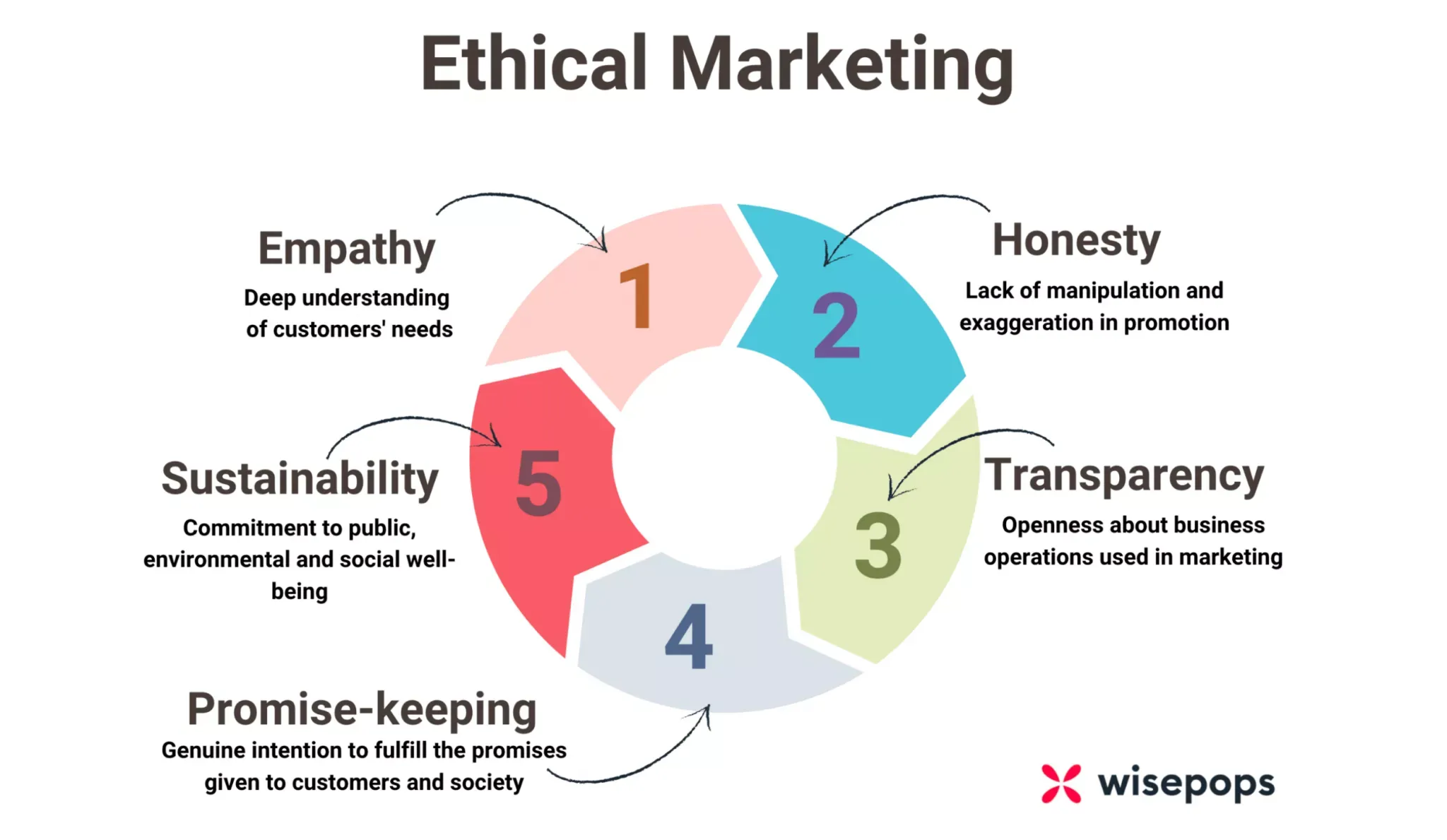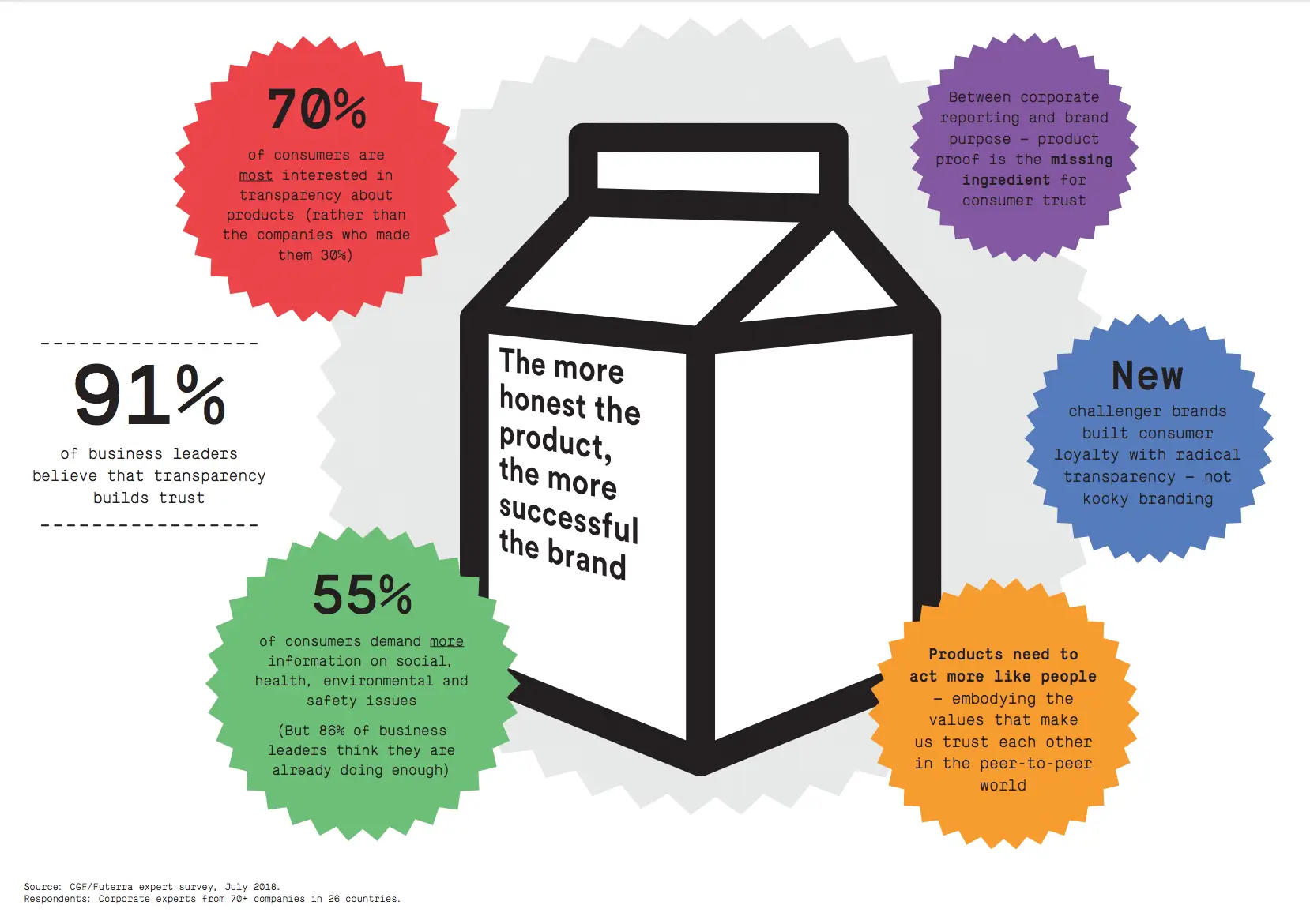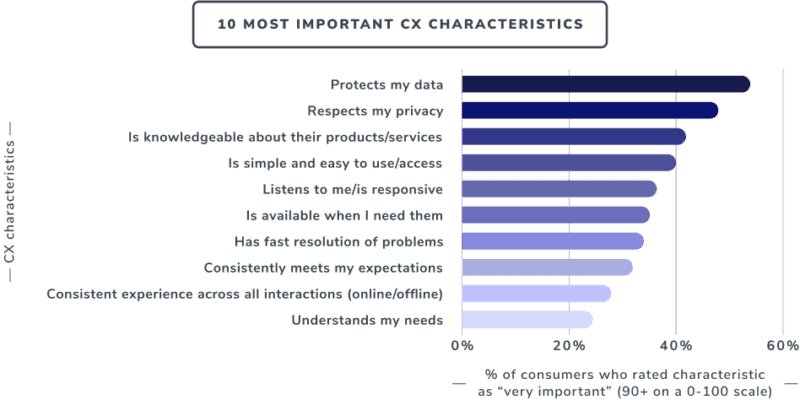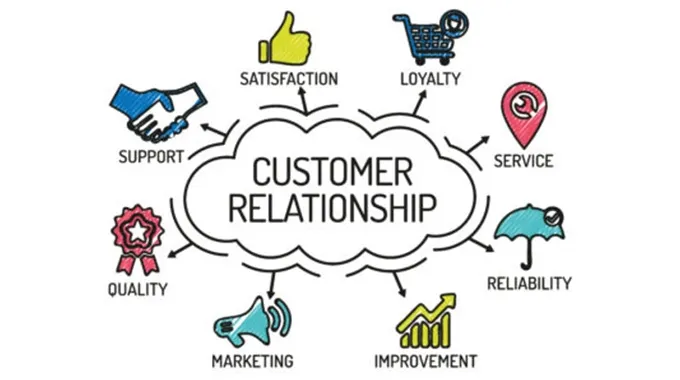Building trust with your audience is not simply good practice in product marketing; it is a requirement.
While the purpose of marketing is to promote items and increase sales, it must be done ethically and transparently.
Consumers are more aware and discerning than ever before, making ethical product marketing an essential component in building a long-term relationship with your target audience.
According to a recent Nielsen survey, 83% of customers believe recommendations from individuals they know, while 66% trust online consumer opinions.
Product marketing ethics are the ideas and criteria that govern businesses' ethical behavior when advertising their products or services.
This article goes into the topic of product marketing ethics, focusing on why it is important, how it benefits firms, and how to incorporate ethical concepts into your marketing strategy.
What is Product Marketing Ethics?

Ethical product marketing is guided by principles that ensure businesses engage in fair and honest practices. These principles revolve around transparency, honesty, and respect for customers' rights.
By following ethical guidelines, businesses avoid deceptive practices and focus on building meaningful and long-lasting relationships with their customers.
Comparison with Unethical Marketing Practices
Unethical marketing uses misleading ads, false claims, and manipulation to deceive customers. This may bring short-term gains but harms a brand's reputation and trust. Ethical product marketing, in contrast, focuses on customer well-being and maintaining credibility.
Benefits of Practicing Ethical Product Marketing
Ethical marketing has various benefits for businesses. It builds a positive brand image, increases customer loyalty and advocacy, and fosters long-term relationships. This leads to higher customer retention and increased sales.
Transparency and Honesty in Product Claims

Transparency and honesty are fundamental pillars of ethical product marketing.
Businesses must communicate accurate and reliable information about their products and services to potential customers.
By being open and transparent, businesses instill trust in their audience and avoid misleading customers.
Importance of Transparency
Transparency breeds trust. When businesses are transparent about their products, including their features, pricing, and limitations, customers feel valued and empowered to make informed decisions.
Transparency goes beyond simple product descriptions and includes clear and easily understandable terms and conditions, disclosure of any potential risks, and clarity in pricing structures.
Honesty in Product Claims
Honesty is the backbone of ethical product marketing. Businesses should refrain from making false claims or exaggerating the benefits of their products.
By providing accurate information about what their products can and cannot do, businesses build credibility with their customers.
Honesty also encompasses promptly addressing any issues or problems, providing refunds or solutions when necessary, and constantly improving products based on customer feedback.
Respecting Consumer Privacy and Data Protection

Respecting consumer privacy and safeguarding their data is paramount, especially today. Businesses have a responsibility to handle consumer data ethically and ensure its protection.
Let's dive into why respecting consumer privacy and data protection is crucial and how businesses can comply with data protection regulations and best practices.
Ensuring Proper Handling of Consumer Data and Privacy
Consumers entrust businesses with their data, such as names, addresses, and financial information.
This data should be handled with the utmost care and respect. Businesses must implement robust security measures to protect consumer data from unauthorized access or breaches.
This includes using encryption, secure storage systems, and regular audits to monitor and mitigate potential risks.
Complying with Data Protection Regulations and Best Practices
Data protection rules like GDPR exist to protect consumer privacy and data. Businesses must follow these rules, including getting clear consent before collecting data, explaining how data will be used, and allowing customers to change their preferences or opt out anytime.
Regularly updating privacy policies and training on data protection show a commitment to ethical data handling.
Avoiding Manipulative Marketing Tactics
Manipulative marketing tactics often influence consumer behavior through misleading or deceptive means.
However, using such tactics can adversely affect trust and long-term relationships with customers.
Instead, businesses should consider ethical alternatives to cultivate genuine connections with their audience.
The Negative Impact of Manipulative Marketing Tactics on Trust
Manipulative marketing harms trust and customer confidence. When people feel tricked, they become wary of future marketing and view the brand negatively. To build trust and loyal customers, honesty and authenticity in marketing are vital.
Ethical Alternatives to Manipulative Tactics
Instead of manipulation, businesses can build trust through sincere interactions. This involves sharing product/service pros and cons, giving accurate information, and delivering great customer service. By prioritizing open and respectful communication, businesses become trustworthy in the eyes of their customers.
Fair and Competitive Practices
Businesses need to prioritize fair practices that promote healthy competition and avoid deceptive tactics.
By competing on the merit, quality, and value of their products or services, businesses can establish a level playing field and gain consumer credibility.
Promoting Fair Competition and Avoiding Deceptive Practices
Deceptive practices, like spreading false information about rivals or tricking customers, damage competitors' reputations and undermine consumer trust.
Businesses should emphasize fair competition by showcasing their own quality and value rather than using dishonest methods. This means not spreading false details about competitors and avoiding tactics that manipulate how customers perceive things.
Competing on Merit, Quality, and Value
By shifting the focus towards the merit, quality, and value of their offerings, businesses can differentiate themselves in an ethical manner.
Providing excellent products or services, delivering exceptional customer experiences, and continuously innovating and improving are effective ways to compete without compromising ethical standards.
When businesses compete based on their strengths, they build customer trust and loyalty, fostering long-term success.
Social Responsibility and Sustainability
In today's world, consumers are increasingly conscious of social responsibility and sustainability.
Businesses must incorporate these values into their product marketing strategies.
Let's explore how businesses can promote ethical sourcing, eco-friendly practices, and corporate social initiatives to align with consumer values.
Incorporating Social Responsibility and Sustainability in Product Marketing
Consumers value businesses prioritize social responsibility and sustainability.
By incorporating these values into product marketing, businesses can attract a wider audience that resonates with these principles.
This includes highlighting efforts to reduce environmental impacts, support fair labor practices, and contribute to the well-being of communities.
Promoting Ethical Sourcing and Eco-friendly Practices
Ethical sourcing involves ensuring that the raw materials used in products are obtained from suppliers who prioritize fair labor practices, environmental conservation, and sustainable sourcing methods.
By promoting ethical sourcing, businesses can show their commitment to supporting responsible production and fair trade.
In addition, adopting eco-friendly practices such as using sustainable packaging materials, reducing waste and emissions, and implementing energy-efficient processes demonstrates a dedication to preserving the environment.
Corporate Social Initiatives
Corporate social initiatives are actions businesses take to address social issues and support communities. This can include philanthropy, volunteer programs, or partnerships with non-profit organizations.
By showcasing these initiatives in product marketing, businesses can enhance their brand image and build trust with socially conscious consumers.
Customers are more likely to support businesses that actively contribute to positive social change.
Building Genuine Relationships with Customers

Building genuine relationships with customers is the foundation of successful marketing. Businesses can establish trust, foster loyalty, and create brand advocates by nurturing these relationships.
Let's explore how open communication, responsiveness, and authenticity are vital in achieving this.
Nurturing Genuine Relationships with Customers
Open communication and responsiveness are fundamental to nurturing genuine customer relationships.
Businesses should value customer feedback, actively seek input, and respond promptly and transparently to inquiries or concerns.
By listening and engaging with customers, businesses can demonstrate their commitment to providing excellent customer experiences.
Fostering Trust and Loyalty
Trust is crucial in any successful relationship. To build trust and loyalty, businesses should consistently deliver on promises, be transparent about products and services, and resolve issues promptly. This involves being honest about limitations, working to improve, and exceeding expectations.
Authenticity in Marketing Communication
Authenticity is vital in marketing. Businesses should communicate in a way that matches their values and appeals to their audience. This means avoiding exaggerations or manipulation and concentrating on delivering genuine value and solutions. Authenticity builds credibility and creates an emotional bond between the brand and the customer.
Ethical Influencer Marketing
Influencer marketing has become a popular strategy for businesses to reach their target audience through trusted individuals in their respective fields. However, it is essential to approach influencer marketing ethically to maintain transparency and authenticity.
Let's explore the considerations businesses should keep in mind.
Ensuring Transparency, Authenticity, and Disclosure
Transparency is vital in influencer marketing. Businesses should ensure that influencers disclose any relationships or partnerships with the brand.
This disclosure helps maintain trust and allows consumers to make informed decisions.
Additionally, working with influencers who genuinely align with the brand values and whose content resonates with the target audience ensures authenticity and a natural fit.
Prioritizing Genuine Recommendations
Influencer marketing should focus on genuine recommendations rather than overt sales pitches.
Businesses should encourage influencers to provide honest and unbiased reviews of products or services, creating a more authentic experience for their audience.
Genuine recommendations build trust and credibility, leading to more meaningful connections and increased customer engagement.
Balancing Profitability and Consumer Welfare
In product marketing, businesses face the challenge of balancing profitability and consumer welfare. While profitability is crucial, prioritizing consumer welfare is equally important. Here's how businesses can ensure fair pricing and quality assurance in their strategies.
Ensuring Pricing Fairness
Businesses should offer reasonably priced products that accurately reflect their value. Unfair pricing practices harm consumers and brand reputation. By setting fair prices and avoiding hidden fees and unnecessary markups, trust and customer loyalty can be built.
Quality Assurance and Customer Satisfaction
Ensuring high product quality is vital for consumer welfare. Businesses should focus on quality control, conducting rigorous testing, and monitoring the manufacturing process to avoid defects. This leads to enhanced customer satisfaction, loyalty, repeat sales, and positive word-of-mouth.
Conclusion
Prioritizing ethical considerations in product marketing is more important than ever.
By balancing profitability and consumer welfare, adopting ethical advertising practices, and avoiding manipulative tactics, businesses can build trust and loyalty with their audience.
As businesses consider their marketing strategies, it's crucial to remember that ethical product marketing is not just a moral obligation but a strategic choice.
Prioritizing ethics can increase customer loyalty, positive word-of-mouth, and enhance brand reputation.
By committing to ethical marketing, businesses can set themselves apart from their competitors while building lasting connections with valued customers.
Remember that trust is the cornerstone of a strong business-customer relationship.
When you follow ethical principles, you not only earn customer loyalty but also establish a positive brand legacy that endures and thrives over time.
So, integrate ethics into your marketing strategy, and you'll discover that trust is the most valuable asset in the business world.
Frequently Asked Questions (FAQs)
Why is building trust with your audience important in product marketing?
Building trust is important as it establishes credibility, cultivates long-term customer relationships, and fosters brand loyalty. Trustworthy marketing practices enhance customer satisfaction and drive business growth.
What are some ethical considerations in product marketing?
Ethical considerations include transparency, truthfulness in advertising claims, respecting customer privacy, avoiding manipulation or coercion, and ensuring fairness in pricing and promotional practices.
How can businesses communicate their commitment to ethical product marketing?
Businesses can communicate their commitment by clearly articulating their values and ethical guidelines, providing transparent and honest product information, and actively engaging in responsible marketing practices.
Are there any regulations or industry standards for ethical product marketing?
Yes, there are regulations, such as consumer protection laws and advertising guidelines, that govern ethical marketing practices. Additionally, industry organizations and associations may have their codes of ethics and standards for marketers to follow.



